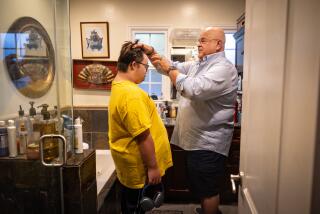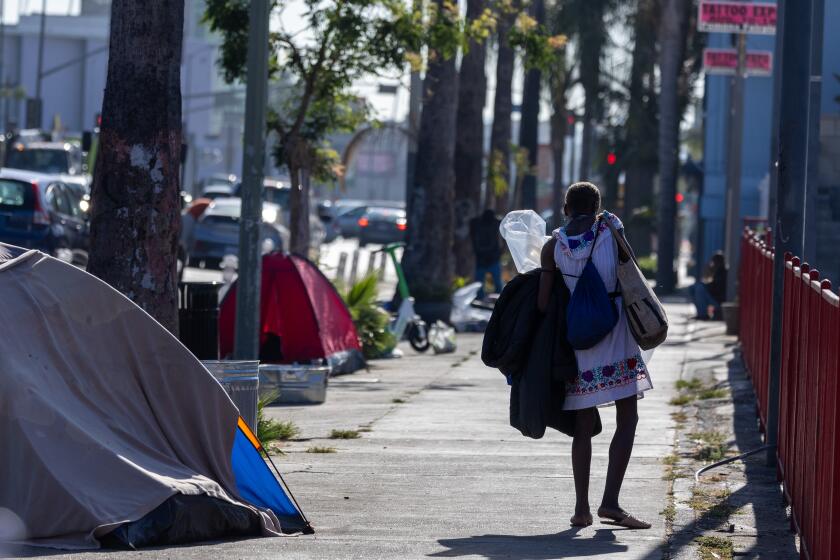Recipients Bemoan New Cuts in Welfare
Shane Garcia, 41, doesn’t blame anyone else for his family’s poverty. Standing in a welfare line in Anaheim Tuesday while waiting for his check, Garcia said his marriage of 22 years fell apart because of his drug use, and then he lost his $40,000-a-year job as a cable installer.
But he is a single father with six boys between the ages of 5 and 15 to feed and care for, and the state-mandated 4.9% cut to welfare that took effect Tuesday will make it difficult to scrape by. The $994 cash grant they used to receive now will be reduced to $945.
Like an ominous storm blown in from the East, the reality of welfare reform has descended with relentless and unsparing force on thousands of families like that of Garcia, who begin the new year today with less cash to live on and the prospect of a welter of new rules aimed at restricting their access to government aid.
As of Tuesday, an estimated 785,389 welfare families in California’s urban areas will get checks that reflect a 4.9% cutback, while another 333,647 families in rural areas will see their welfare checks reduced by 9.8%.
“All this happened just this year to me, and it’s been real rough,” Garcia said as the line inched forward. After going through drug rehabilitation, he found himself a single parent, and has been dazed by the sheer quantity of labor it takes to run his household.
Garcia and his sons live in a three-bedroom apartment in Anaheim, and paying the rent, he said, consumes almost all of his welfare check.
“Can you imagine how much they eat?” Garcia said. “My 15-year-old is already 6-foot-1. This is gonna hurt us bad.”
Behind Garcia snaked a long line of Orange County’s poor. Many held small children by the hand, others waited alone for their turn at the window where people could pick up their checks.
In the same line, Donna Childs, 35, waited with one of her twin 6-year-old boys.
“I’m just really thankful that the state helps me,” Childs said. “Even though it’s tough, I can still take care of my kids.”
Her rent in an Anaheim apartment is $550 a month and her welfare grant, which was $594, is now cut to $565. “How do I make it? I make it on faith,” she said. “But I’m not going to complain. I’m grateful the taxpayers are helping me.”
The bill signed in August by President Clinton incorporated sweeping changes in public aid programs enacted more than 60 years ago, ending the federal Aid to Families With Dependent Children program and transferring most authority for running welfare programs to the states.
California officials have wasted little time in implementing several laws that had been passed in recent years by the state Legislature but had needed federal approval.
About 114,000 people in Orange County receive Aid to Families with Dependent Children and about 60% of those saw their grants slashed Tuesday. The remaining 40% earn legal income from employment and will not lose money because of state laws designed to make it profitable for welfare recipients to work.
To some extent, the salary incentive is showing signs of achieving its goal of encouraging welfare recipients to find jobs. When the state first allowed welfare recipients to keep part of their earnings, only 17% of Orange County’s welfare recipients took jobs--a number that has grown to 40% in just three years.
Now, a stick has been added to the carrot. Those who do not go out to earn more money will see their welfare checks reduced.
“Think about it, if someone reduced your salary year after year after year, then you’d probably feel the necessity to go out and look for another line of work or another employer,” said Angelo Doti, director of financial assistance for Orange County’s Social Services Agency. “Remember, welfare reform is a philosophical and moral document as well as a financial document.
“It starts with the premise that certain things are good: marriage, family, not having illegitimate children and, of course, work,” Doti said. “The state sees this as an inducement for people to become more responsible and go out and strive to find a job.”
The benefit cuts are but the first volley of a series of tough new state and federal restrictions that will change the landscape of welfare in California:
* Beginning in March, teenage mothers on welfare will have to live with their parents or in some other approved adult-supervised setting.
* Also in March, the state intends to begin giving newcomers to California the same amount of aid they received in their home state for the first year of their residence here.
* In April, county welfare officials will begin denying food stamps to legal immigrants who have not worked in the U.S for at least 10 years or who are not otherwise exempted.
* In July, thousands of disabled children will lose eligibility for federal Supplemental Security Income under newly stringent criteria imposed by the welfare law.
* And beginning in August, a family’s benefit check will no longer increase if the mother has additional children while on welfare.
Later this month, Gov. Pete Wilson will unveil specifics of a new plan meant to reconfigure the infrastructure of welfare on such crucial issues as how long families can remain on public aid, who will be exempted from time limits, the types of activities that can be counted as work, and the organization and funding of child care programs for poor families and those on welfare.
State officials say the changes will force recipients off the dole and into jobs. They argue that for many recipients, welfare has become a way of life that has beckoned its victims like an addictive drug.
“Multi-generations of kids on welfare have grown up thinking it’s normal, that it’s OK,” said Janice Ploeger Glaab, a spokeswoman for the California Health and Welfare Agency, which is coordinating implementation of much of the state’s welfare overhaul. “One of the governor’s key visions is that we have to make people be personally responsible for their lives. It is a much better role model to see parents going off to work everyday than to see them going out to the mailbox for a check.”
Glaab said efforts will be made to ensure that children are not unduly penalized under the new rules. It is likely, for example, that safeguards will be installed in some programs to make sure children receive services directly, rather than having a check simply handed to a parent.
Glaab acknowledges that the cutbacks and restrictions will engender fear and in some cases resentment “But with families who have an able-bodied adult who chooses not to work, it is very difficult to sit there for five or seven or 10 years and cut them slack,” she said.
But many welfare recipients say the changes are only likely to further reduce the standard of living for themselves and their children.
“It seems like every time you take one step forward, they make you take two steps back,” sighed Kathy Doran, 43, of La Habra, who said her monthly check will be reduced to $467 from $496.
She will make ends meet, Doran said, by visiting churches and food kitchens that offer free groceries.
Throughout Southern California, welfare recipients expressed similar opinions.
“We are the guinea pigs of ‘97,” said Yvonne Parris, 26, a Los Angeles County resident whose monthly check also has been reduced to $467. “They come out with these ideas to see if they’re going to work and they try it out on us people without knowing what the result is going to be.”
For Ventura resident Kimberly Ware, the grant reduction amounts to roughly $48, about the size of her electric bill, she said.
“I don’t see how they feel we can make do with less and less while we’re trying to get on our feet,” said Ware, who will use her $948 monthly check to house and feed her six children.
Although the changes will cut government spending, those receiving aid see the changes as another hardship, one that will strain household budgets already stretched thin.
“The cutbacks are ridiculous, especially for the people who really need it and the children who need it,” said Delores Kovach of Simi Valley.
With three children under 5, Kovach has to live with her parents to make ends meet. She recently took a waitressing job but still dreads watching her $675 monthly checks shrink.
“They don’t give you enough to live on,” she said. “I don’t really go out and spend money on anything.”
Many who are against the cuts argue that the welfare overhaul does little to address the fundamental causes of poverty, but is instead based on long-standing myths and prejudices.
Some social service analysts have predicted that more than 1 million additional children nationwide will be pushed into poverty by the new law, which places a five-year lifetime limit on cash benefits and requires most recipients to find work within two years. Most recipients will lose all benefits after five years, though 20% of the most unemployable recipients will be allowed to stay on welfare.
Welfare reform as currently packaged addresses “false problems conjured up for points to be made by political interests,” charged Casey McKeever, directing attorney for the Western Center on Law and Poverty in Sacramento.
McKeever said the reasoning behind some of California’s changes has already been called into question by the experience of other states. New Jersey, for example, has already implemented laws that bar mothers from receiving assistance for additional children born while they are on welfare, with no apparent reduction in the birthrate, said McKeever.
California’s attempt to limit grants to new residents will almost surely be challenged in court, McKeever said. The state first passed such a law in 1992, but a U.S District Court judge ruled that the provision violated the equal protection clause of the 14th Amendment, unjustly discriminating against out-of-state residents and their right of interstate travel. The U.S. Supreme Court dismissed the case without deciding the constitutional issue because the state had not received a federal waiver at the time.
Times correspondent David R. Baker in Ventura County contributed to this story.
More to Read
Sign up for Essential California
The most important California stories and recommendations in your inbox every morning.
You may occasionally receive promotional content from the Los Angeles Times.












